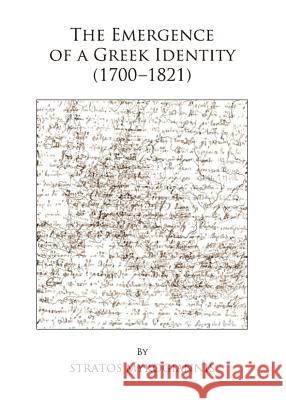The Emergence of a Greek Identity (1700-1821) » książka
The Emergence of a Greek Identity (1700-1821)
ISBN-13: 9781443836463 / Angielski / Twarda / 2012 / 215 str.
This book examines the role of Greek-speaking intellectuals in nation-formation processes during the Greek Enlightenment. The author explores how scholars invoked the concept of the 'nation' and issues closely related to it in order to enforce their demands either for educational reform or for national independence. To be more specific, he studies the construction of a Modern Greek identity in relation to the Greek and European Enlightenment from 1700 up to the outbreak of the Greek War of Independence in 1821. The theoretical framework the author deploys is twofold. On the one hand, he exploits the methodological tools provided by the 'history of concepts', as formulated by Koselleck, Pocock and Skinner. On the other hand, he deploys specific concepts from current approaches on nation-formation processes in history, drawn especially from the works of Anthony Smith, Benedict Anderson and Eric Hobsbawm. He examines the discursive strategies but also the ideology of relevant works, mainly geographies, histories and political treatises. The corpus of works he studies includes both well-known texts (e.g. by Koraes, Katartzis and Rigas), but also much ignored and so far unexamined works (e.g. by Stanos and Alexandridis). Three arguments are intertwined in the present study. The first issue that this thesis claims to address is the exploration of the incorporation of Byzantium into a Greek historical schema. During the eighteenth century Greek intellectuals attempted to rewrite the history of the Greeks and their main problem was integrating in their narrative the Greek Middle Ages. This period was viewed by them as a historical gap. In their attempt to bridge this gap, the answer they gradually came up with was the invention of what Koraes first named, earlier than is previously thought, 'Byzantine history'. Secondly, the present study clarifies the particularities of a transformation process regarding the self-image of the Greeks as a political community. This process is evident in the writings of Greek-speaking intellectuals. Influenced by modernity and the emergence of the new political paradigm of the 'nation' these scholars imagined Greek-speaking people in terms of a national community. The third argument this book aims to develop is the historical link between the Enlightenment as a philosophical movement and nationalism as an ideology. The author suggests a reinterpretation of the last stage of the Greek Enlightenment. He argues that Greek-speaking scholars transmuted enlightening doctrines into a nationalist ideology in order to satisfy the new political needs of the Greek nation for the creation of an independent state. This enlightened nationalism, however, was not related to the subsequent Romantic ideology, but it was based on the liberal ideas of the Enlightenment. All in all, this book aims to contribute to the study of the Greek Enlightenment by throwing further light on the complex issues of self-image and identity.











